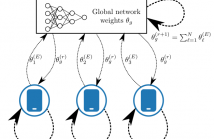
- Read more about Importance Sampling Based Unsupervised Federated Representation Learning
- Log in to post comments
The use of AI has led to the era of pervasive intelligence, marked by a proliferation of smart devices in our daily lives. Federated Learning (FL) enables machine learning at the edge without having to share user-specific private data with an untrusted third party. Conventional FL techniques are supervised learning methods, where a fundamental challenge is to ensure that data is reliably annotated at the edge. Another approach is to obtain rich and informative representations ofunlabeled data, which is suitable for downstream tasks.
- Categories:
 20 Views
20 Views
- Read more about Federated Dataset Dictionary Learning For Multi-Source Domain Adaptation
- Log in to post comments
In this article, we propose an approach for federated domain adaptation, a setting where distributional shift exists among clients and some have unlabeled data. The proposed framework, FedDaDiL, tackles the resulting challenge through dictionary learning of empirical distributions. In our setting, clients' distributions represent particular domains, and FedDaDiL collectively trains a federated dictionary of empirical distributions. In particular, we build upon the Dataset Dictionary Learning framework by designing collaborative communication protocols and aggregation operations.
- Categories:
 9 Views
9 Views
- Read more about A Method to Reveal Speaker Identity in Distributed ASR Training, and How to Counter It
- Log in to post comments
End-to-end Automatic Speech Recognition (ASR) models are commonly trained over spoken utterances using optimization methods like Stochastic Gradient Descent (SGD). In distributed settings like Federated Learning, model training requires transmission of gradients over a network. In this work, we design the first method for revealing the identity of the speaker of a training utterance with access only to a gradient.
- Categories:
 24 Views
24 Views